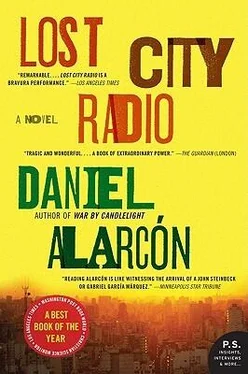“Hush, Rey,” Norma said.
It was then that Manau’s mother stepped back into the room. She’d been watching through the cracked kitchen door, listening to her son and his visitors for the last half hour, unable to discern who was what to whom in this strange trio. Something was not quite right with the woman named Norma and her own son: what had happened to her Elijah? She carried a tray and a thermos with hot water. “Does anyone want more tea?” she said, with all the innocence she could muster. Her son, the woman, and the boy were looking over the parchment, no one saying a thing. “Oh,” Manau’s mother said, because silence had always, always troubled her, “what a fine drawing! What a handsome young man!”
“It’s Rey,” Norma said.
“It’s your father,” said Manau to the boy.
Understanding neither comment, Manau’s mother returned quickly to the kitchen, where she stood by the door and listened for many minutes, but heard nothing.
In the morning, when the door was unbarred and the windows opened, Norma kissed Rey good-bye and walked back to the radio station. She had washed her face with a splash of water from a communal basin. “How will you make it home?” she asked her husband. She felt an acute exhaustion, a soreness that ran the length of her legs. Rey smiled and said he would walk. The air still smelled of smoke, and the sky was stained sepia. Many buildings had burned the previous night, and some, at that hour, were still burning.
DURING THE summer of the eighth year of the war, a radio personality at the station where Norma worked disappeared. The authorities denied any involvement, but the rumors spoke of treason and collaboration with the IL. His name was Yerevan, and it shook everyone who knew him. Quiet and unassuming, of slight build and mottled complexion, Yerevan was a confirmed bachelor who lived for his radio show, a twice-weekly late-night classical music program. He taught a class at the university as well, specializing in the development of Western music after the discovery of the New World. He was popular and well liked among the students.
For a few weeks after his disappearance, there was a clamor. Yerevan and the station’s director had been very close, and so the radio was un-characteristically bold in his defense, broadcasting hourly proclamations of Yerevan’s innocence and demanding his release. Groups of university students kept vigil in front of the station. Fans of his show came as well, and there was a strange feeling to the demonstrations. An unlikely cross-section of the city had been assembled: aficionados of classical music, students of history and art, late-night shift workers, various insomniacs and shut-ins. Most had never seen the accused, but all knew his voice well and admired his keen taste and encyclopedic knowledge of the music. It was, as far as protests go, a joyful gathering. A string quartet, laid off from the recently dissolved City Orchestra, played for the crowd one evening at the hour Yerevan’s show would have aired. The radio, in an inspired decision, carried the performance live.
In spite of all this, Yerevan was sent to the Moon where he surely received the kind of welcome that Rey had survived nine years before. Two weeks passed, and Yerevan was not heard from. Everyone expected the worst. It was no secret by now what sorts of things happened to those who disappeared. He had been, in the year or so prior to his disappearance, a friend of Norma’s. She had recovered from her fear that night of the first Great Blackout, and proven her mettle on more than a few occasions. She was on the air now with some regularity, though the cult of her voice was not yet what it would become. Norma often stayed late at the station, editing pieces for the following morning’s news hour and, when her work was done, she liked to visit Yerevan in the sound booth. The soothing music was a draw, as was his quiet good nature, but mostly, she liked the feel of the room. It was the heart of the radio, and this was before she had become disenchanted with it all. She loved this place, the hum of its machines, its light and music and motion. A few times, she had produced the show, patching through calls from listeners who wanted to request a song or simply speak with Yerevan about music. There was a looseness to it that Norma liked: it was late night, and so there were fewer time constraints. Yerevan was content to let his callers talk, Norma happy to listen, and in these moments, she felt that the radio might actually serve a purpose.
What made the episode so curious was the revelation, a few weeks after Yerevan’s sudden disappearance, that there was, in fact, some truth to the rumors. Some of the callers, it was said, had been speaking in code. Norma, after consulting with Rey, went to discuss the situation with Elmer, and he admitted that the station director was afraid. It was, Elmer said, worse than they had previously suspected. The station had indeed been infiltrated. A search had been ordered for tapes of Yerevan’s recent shows.
“He was IL, Norma, and no one knew,” Elmer said. “What could we do?”
Norma had spent many hours with the accused, had monitored the calls, chatted good-naturedly with people she assumed to be music lovers, but who, in actuality, might have been terrorists. She’d even been on the air a half dozen times, introducing songs, discussing music with Yerevan. Had she implicated herself?
“Should I be afraid?” she asked.
Elmer nodded. He was thoughtful and capable, and it was universally assumed he would one day be director himself. “You can stay at the station for a while. We’ll make room for you and you’ll be safer here.”
That night, her exile began. It would be a month before she would go home again. The next day, the radio abruptly canceled any further protests, and even went so far as to ask the army to disperse those Yerevan supporters who remained. The forces of order complied enthusiastically with the request, and so dozens of students and music lovers and night-shift workers and even a few unfortunate passersby were beaten and then arrested in the lot adjacent to the radio. For an hour or so, there was a pitched battle, with stone-throwing and tear gas spreading in great, sickly clouds across the avenue. Many of the employees of the radio gathered in the conference room to watch the events from the broad windows, and Norma was among them. She had slept there that night, quite uncomfortably, in the same conference room where she would meet Victor eleven years later. Her neck hurt badly. She watched the battle, as they all did, without comment, foreheads pressed against the window, looking down. She was grateful for the tear gas: through its fog, there were intimations of great violence, but she was spared the sight of it. The battle had erupted in the middle of the day, but the station’s director decided to omit any mention of it from the news. He felt, quite justly, that his job had become far too dangerous. Within the year, he would authorize a report obliquely critical of the interior minister and pay for this mistake with his life. Elmer would happily replace him.
This was the sort of country it had become.
In 1797, it should be noted, Yerevan was not missed at all. Classical music was thought of as foreign and pretentious. The only fan of his show was the village priest, who had, by this point, been dead four years.
WHEN HIS only son was born, Rey was in the city, only vaguely aware that his mistress was due. These were the days when Norma was a prisoner of the radio station. They spoke on the phone four times a day, and each afternoon, he made a trip to the radio to see her. His life in the city, his life as a husband and scientist, was all-consuming; whatever had or might soon happen in the far-off jungle, Rey couldn’t fathom. In the here and now, he was worried about Norma. She wasn’t handling the stress well. She was losing weight and, when he saw her, she worried aloud that her hair was falling out. “Stay with me,” she asked him one afternoon, a week into her exile. Her eyes were red and puffy. “Stay with me tonight.”
Читать дальше












